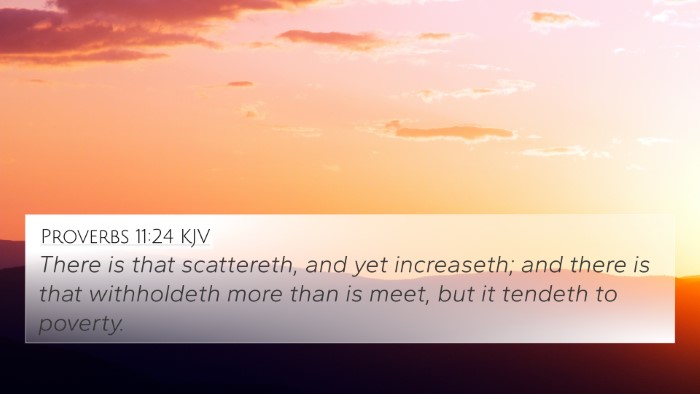Understanding Proverbs 10:4
Proverbs 10:4 states: "He becomes poor who deals with a slack hand, but the hand of the diligent makes rich." This verse highlights the contrast between laziness and diligence, underscoring the value of hard work and its rewards.
Verse Meaning and Insights
This proverb presents two opposing ideas: poverty resulting from careless actions and prosperity resulting from diligence. Insights drawn from public domain commentaries provide a deeper understanding of these concepts.
Matthew Henry's Commentary
According to Matthew Henry, diligence is a virtue that leads to success and wealth. He emphasizes that a "slack hand" symbolizes inaction, irresponsibility, and lack of motivation, whereas a "diligent hand" represents industriousness and commitment. Therefore, hard work is not only commendable but essential for achieving prosperity.
Albert Barnes' Commentary
Albert Barnes interprets this verse as a warning against slothfulness. He explains that neglect and procrastination can lead to poverty, a state that, while preventable, can befall those who choose to ignore their responsibilities or fail to apply themselves. The diligent person, in contrast, is rewarded by their efforts, often leading to wealth and a bountiful life.
Adam Clarke's Commentary
Adam Clarke expands on the concept by illustrating how diligence yields not just material wealth but also personal growth and fulfillment. Clarke notes the biblical principle that diligence within one’s work, regardless of its nature, results in beneficial outcomes and unavoidable blessings.
Related Bible Cross-References
Several other scripture passages resonate with the themes presented in Proverbs 10:4:
- Proverbs 12:24: "The hand of the diligent shall bear rule: but the slothful shall be under tribute."
- Proverbs 13:4: "The soul of the sluggard desires, and has nothing: but the soul of the diligent shall be made fat."
- Proverbs 21:5: "The thoughts of the diligent tend only to plenteousness; but of everyone that is hasty only to want."
- Proverbs 22:29: "Seest thou a man diligent in his business? he shall stand before kings; he shall not stand before mean men."
- Ecclesiastes 9:10: "Whatsoever thy hand findeth to do, do it with thy might..."
- Colossians 3:23: "And whatsoever ye do, do it heartily, as to the Lord, and not unto men."
- Galatians 6:7: "Be not deceived; God is not mocked: for whatsoever a man soweth, that shall he also reap."
Thematic Connections to Other Scriptures
This verse integrates well with various theological themes throughout the Bible, particularly concerning the virtues of hard work and the consequences of laziness. By cross-referencing these texts, one can observe a consistent biblical narrative promoting diligence:
- Hard Work and Prosperity: The thematic elements encourage a strong work ethic, connecting to practical exhortations throughout scripture.
- Divine Wisdom: Wisdom literature, such as the book of Proverbs, often emphasizes themes of diligence and prudence, aligning with the overarching divine guidance in achieving financial and spiritual success.
Comparative Bible Verse Analysis
The comparative analysis of various Bible verses uncovers a rich tapestry of theological insights regarding diligence:
- Luke 19:17: This verse reflects on the rewards of faithful stewardship and diligence.
- 1 Corinthians 15:58: "Therefore, my beloved brethren, be ye steadfast, unmovable, always abounding in the work of the Lord..." highlights the importance of enduring effort.
Tools for Bible Cross-Referencing
To explore these themes further, consider utilizing tools for Bible cross-referencing such as:
- Bible Concordance: A comprehensive index of words and scriptures that can guide you in locating related texts.
- Bible Cross-Reference Guide: Helpful books or software that illustrate connections between verses.
- Crossover Bibles: Versions that have cross-references conveniently placed in the margins.
Conclusion
Proverbs 10:4 serves as a potent reminder of the relationship between diligence and prosperity. By drawing insights from various esteemed commentaries and exploring related scriptures, one can grasp the profound implications of this teaching. Understanding the connections between Bible verses not only enriches our knowledge but also enhances our spiritual lives.

















